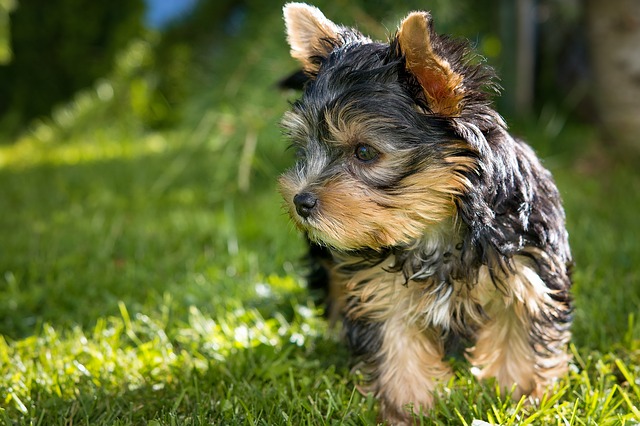
Dog Breed Guide: Yorkshire Terrier
Yorkshire Terriers, or Yorkies as they are affectionately known by those who know and love them, are the quintessential terriers. Proof that good things come in small packages; they’re adorable, friendly, and full of spunk. They may be small, but they have no idea! In fact, you’ll often wonder how such a large and courageous heart can live in such a small dog.
If you’re looking for a small family dog that gets along well (once socialized) with other dogs, cats, and kids, that looks like a million dollars, and that will be a fun and feisty addition to your household and your pack, then this little terrier may well be it.
History of the Yorkshire Terrier
Yorkshire Terriers may look like pampered pooches these days, but when the breed was first developed in the United Kingdom about a hundred years ago, they had a less than glamorous job: ratters.
Thanks to their small size, Yorkies were the perfect breed to chase rats in mines and to follow other vermin into their burrows. So, like several other small breeds, the breeders of the Yorkie took full advantage of that well-developed hunting instinct so common in the terrier class.
Yorkies originated in Scotland, but at first, they were known by the much less intriguing name, Broken-haired Scotch Terrier. They first appeared in a show in England in 1861, still under that name, and it stuck for nine more years.
Eventually, however, a reporter is said to have suggested the name change and the Yorkshire Terrier was born. It took a few more years of selective breeding before the larger dog that was the norm in the late 1800s became the silky-haired little showstopper we know and love today, but once they had, their status as a pampered pooch with a few hidden surprises was cemented.
Since Yorkies still make the list of most popular breeds year after year, that status hasn’t changed.
General Physical Characteristics of Yorkshire Terriers
Yorkies are little dogs. In fact, at just 9 inches at the shoulder and weighing in somewhere between 5 and 7 lbs., they were almost designed for doggie carriers!
Because of their small size and their popularity as lap dogs, Yorkies are considered part of the Toy group rather than Terriers, even though they definitely share the spunky personality of other Terriers!
Yorkshire Terriers are typically black and tan or silver and tan, with refined features and long, silky hair. This silky coat will need daily grooming to keep it in good shape and a top knot to keep strands out of your dog’s eyes. Alternatively, if you’ve chosen a Yorkie as a companion rather than a show specimen, a trip to the groomer can trim and tame that hair and make your little buddy a lot less of a commitment!
Temperament and Character of Yorkshire Terriers
Yorkies are the canine proof that dynamite comes in small packages!
While they might look refined and quite posh with their long silky hair, these little guys love nothing more than to be part of the pack – as long as they are socialized properly from early on!
They’re good with kids (as long as the kids are good with dogs!) and can be taught to tolerate cats, but thanks to that ever-present hunting instinct, they should be kept far away from small animals, particularly rodents!
Yorkies can be very vocal, too, and while they are a great early warning system, if left unchecked, their barking could become a problem for you and your neighbors.
Lifespan of the Yorkshire Terrier
Like many small breeds, Yorkies are expected to enjoy a fairly long lifespan, usually between 14 and 16 years, although there are some who can live considerably longer than that with the right kind of medical care and a little luck.
Common Health and Personality Issues
Yorkies are generally fairly hardy little dogs, given their miniature size. However, while they will probably be healthy as long as they have regular trips to the vet and proper care, there are a few health issues that they are known for:
- Bronchitis and other respiratory disorders. Tracheal collapse, particularly following strenuous exercise, is another concern.
- Eye problems including distichiae, causing corneal abrasions and ulcers, and cataracts.
- Hypoplasia of dens, which is a malformation of the spine, which can cause serious mobility issues or even paralysis.
- Lymphangiectasia, which is an intestinal disorder related to lymph vessels.
- Legg–Calvé–Perthes syndrome, which is a congenital degeneration of the head of the femur. Treatment is surgical, similar to what is often used to treat hip dysplasia.
- Luxating patellas, or slipping kneecaps.
- Portosystemic shunt, which is a deformation of the portal vein, and which affects the proper operation of the liver.
- Yorkies are also prone to the so called “reverse sneeze” which is a snorting sound that, while worrying, is usually not serious.
- Like many small breeds, Yorkshire Terriers are also prone to dental and gum issues. Make sure that you pay close attention to their dental health, try to feed some hard foods, brush regularly and be sure to include dental checkups in your routine veterinary visits.
Remember that because of their size, Yorkies are more prone than many breeds to injuries due to rough play or household accidents. If you share your home with one, you will need to be hyper-aware of where your little buddy is so that you can avoid any injuries.
Finally, remember that even though they are little, Yorkies still need exercise. In fact, especially if they are spayed or neutered, and as they get older, a short walk once a day will help to keep the extra pounds at bay, and when one pound is a fair portion of your body weight, that’s critical!
